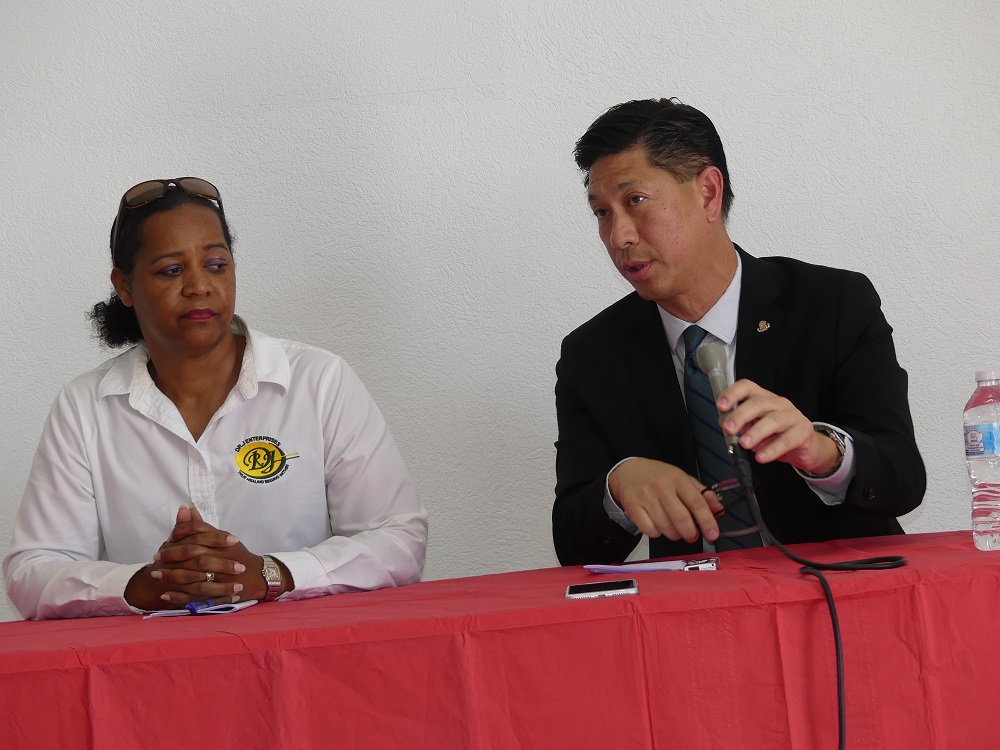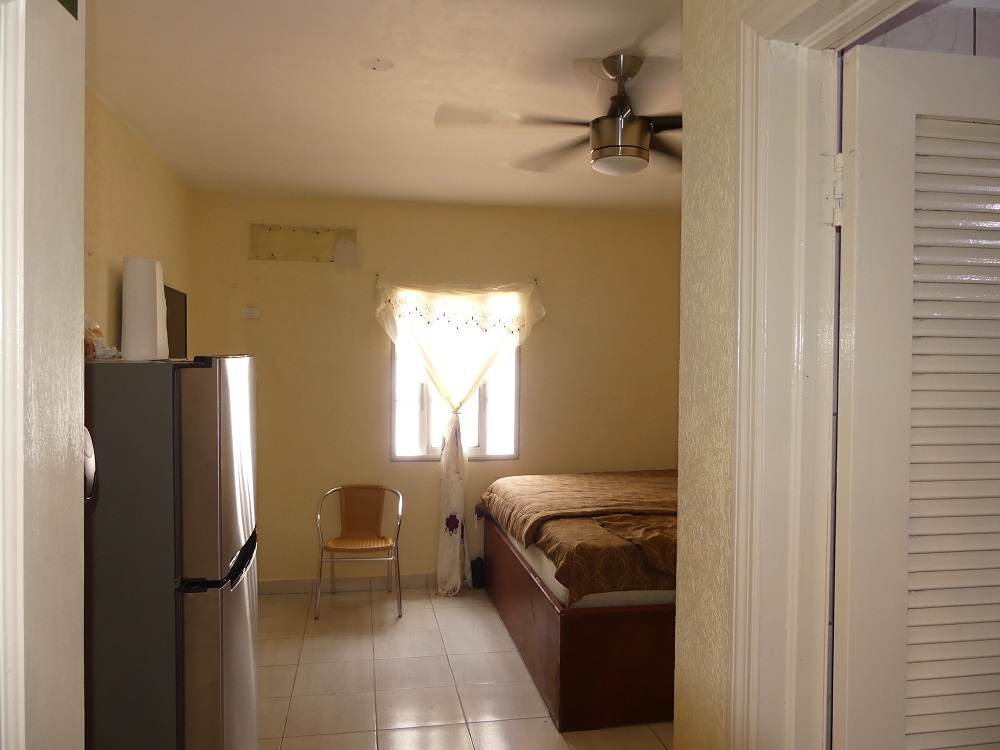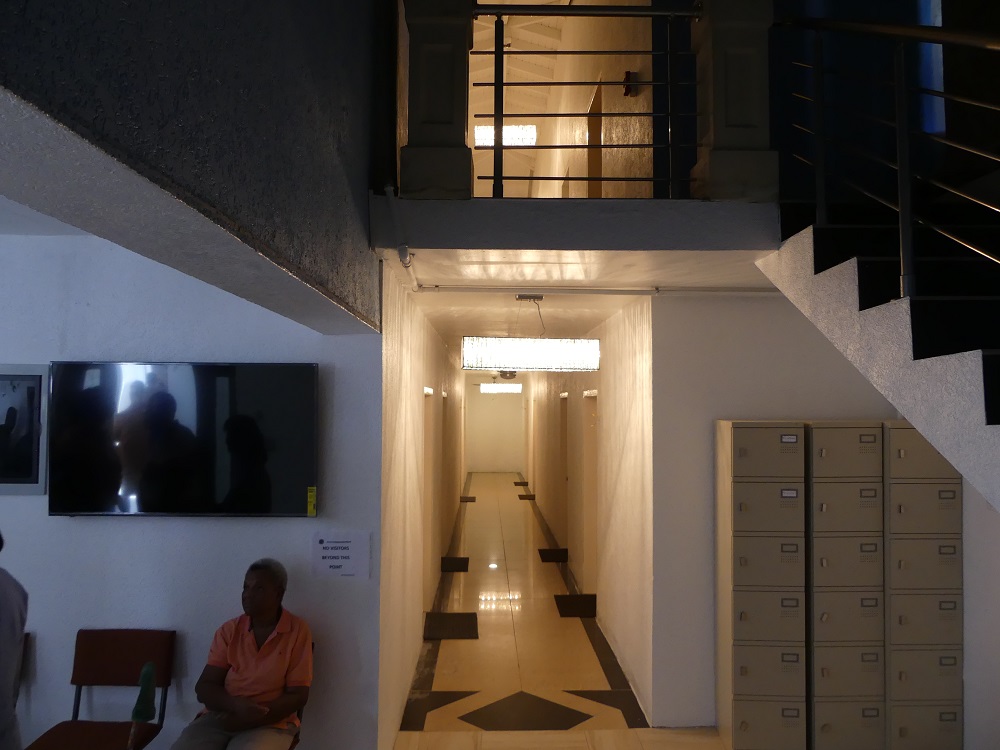Transition-shelter: a place for privacy, dignity and respect

PHILIPSBURG – “A place where people can live in privacy, with dignity and respect.” That’s how Minister Emil Lee (Public Health, Social Development and Labor) described on Thursday the transition shelter (or T-shelter, for short) in Sucker Garden, housed behind El Capitan in the building that formerly was home to the now bankrupt Hypnotic brothel.
The building has shed its rather shady past due to a spectacular renovation effort. The walls on the inside and the outside are of a sparkling white, the old rambling gate has been replaced with a sturdy new one and the rooms that now give temporary shelter to victims of Hurricane Irma – simple as they may be – are heaven for the occupants who previously had to make do with cramped accommodations in the Festival Village and the adjacent Little League Ball Park.

Minister Lee and psychologist Judith Arndell hosted a tour of the facility on Thursday afternoon. The rooms, studios and suites all have their private bathrooms, a fridge a flatscreen TV and of course one or more beds.
Their occupants moved into the building on March 30; they had to qualify for a place at the shelter through a screening procedure that included a mandatory drug test. Currently there are 34 Irma-victims living in the shelter, but Dr. Arndell said that there is room for more: with double occupancy, the place is able to accommodate to 65 people.
The Ministry of Public Health, Social Development and Labor signed a 2-year contract with the Dr. J. Foundation of Dr. Judith Arndell for the management of the place. In the future the building will also be fit to function as a hurricane shelter.
“This is not a housing solution for people who have lost their homes,” Minister Lee said after the tour during a brief press conference. This is a place where we help people to rebuild their lives.”
The transition-shelter – the chosen name already indicates that the facility is not designed for permanent stay – has rooms, studios and suites and also kitchen facilities.
“More importantly,” the minister said, “We provide support for people to rebuild their lives. That is what this T-shelter is all about – helping the most vulnerable in our community.”
The shelter offers for instance job vacancies on a bulletin board, but it also provides counseling to teach occupants how to apply for a job, how to put a resume together and how to restructure their lives.
There are also house rules: “We wanted to make sure that this is a nurturing and safe environment for all the people who are living here,” Lee said. “It is about creating a community where people can live safely, knowing that they don’t have to worry about their safety. A place where they can live with privacy, dignity and respect.”
The shelter offers temporary stay: “Hopefully, within a period of four months we can not only help them to find proper jobs, but also to save money so that they can improve their housing situation,” the minister said.
“The house rules are a bit strict but we want to ensure everybody’s safety,” Judith Arndell said. “I want to ensure that this place does not become infected with violence, drugs, crime and gangs. We don’t want people who don’t belong here using and abusing the facility.”
To that extent, the T-shelter has 24/7 security, not only at the gate, but also in the building.
Arndell has furthermore established a curfew: at 10 p.m. the gate closes “to ensure good management of what is happening here and to control who is going in and out.”
The shelter’s occupants pay a contribution for their stay based on their individual financial situation. Ten of the occupants currently have a job. “The shelter puts this money aside and returns it to the occupants at the end of their stay.
Minister Lee brought another issue forward: “This shelter has become a focal point for the ministry. It is a central location where supermarkets can deliver food items they would otherwise discard.”
The hospitality training program is always looking for places where students can prepare food, Lee added. “Here they can not only prepare it, but also serve it, so this place could become a training ground for waiters and waitresses. We could operate this place as a full-blown restaurant.”

Photo caption: The hallway within the transition-shelter. Photo Hilbert Haar.
Top photo caption: Dr. Judith Arndell and Minister Emil Lee during the press conference at the transition-shelter on Thursday. Photo Hilbert Haar
Middle photo caption: One of the rooms in the transition-shelter. Photo Hilbert Haar.























